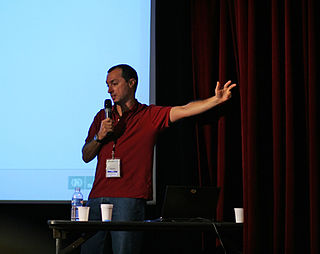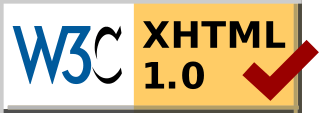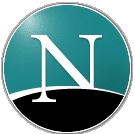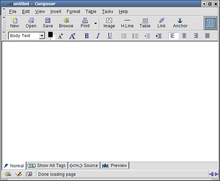
Netscape Navigator is a discontinued proprietary web browser, and the original browser of the Netscape line, from versions 1 to 4.08, and 9.x. It was the flagship product of the Netscape Communications Corporation and was the dominant web browser in terms of usage share in the 1990s, but by around 2003 its user base had all but disappeared. This was partly because the Netscape Corporation did not sustain Netscape Navigator's technical innovation in the late 1990s.
Gecko is a browser engine developed by Mozilla. It is used in the Firefox browser, the Thunderbird email client, and many other projects.
An HTML editor is a program used for editing HTML, the markup of a web page. Although the HTML markup in a web page can be controlled with any text editor, specialized HTML editors can offer convenience, added functionality, and organisation. For example, many HTML editors handle not only HTML, but also related technologies such as CSS, XML and JavaScript or ECMAScript. In some cases they also manage communication with remote web servers via FTP and WebDAV, and version control systems such as Subversion or Git. Many word processing, graphic design and page layout programs that are not dedicated to web design, such as Microsoft Word or Quark XPress, also have the ability to function as HTML editors.
XForms is an XML format used for collecting inputs from web forms. XForms was designed to be the next generation of HTML / XHTML forms, but is generic enough that it can also be used in a standalone manner or with presentation languages other than XHTML to describe a user interface and a set of common data manipulation tasks.

Daniel Glazman is a JavaScript programmer, best known for his work on Mozilla's Editor and Composer components and Nvu, a standalone version of the Mozilla Composer, created for Linspire Corporation. He lives in France.
This is a comparison of both historical and current web browsers based on developer, engine, platform(s), releases, license, and cost.

The Markup Validation Service is a validator by the World Wide Web Consortium (W3C) that allows Internet users to check pre-HTML5 HTML and XHTML documents for well-formed markup against a document type definition (DTD). Markup validation is an important step towards ensuring the technical quality of web pages. However, it is not a complete measure of web standards conformance. Though W3C validation is important for browser compatibility and site usability, it has not been confirmed what effect it has on search engine optimization.

SeaMonkey is a free and open-source Internet suite. It is the continuation of the former Mozilla Application Suite, based on the same source code, which itself grew out of Netscape Communicator and formed the base of Netscape 6 and Netscape 7.

The Mozilla Application Suite is a discontinued cross-platform integrated Internet suite. Its development was initiated by Netscape Communications Corporation, before their acquisition by AOL. It was based on the source code of Netscape Communicator. The development was spearheaded by the Mozilla Organization from 1998 to 2003, and by the Mozilla Foundation from 2003 to 2006.
The Mozilla application framework is a collection of cross-platform software components that make up the Mozilla applications. It was originally known as XPFE, an abbreviation of cross-platform front end. It was also known as XPToolkit. To avoid confusion, it is now referred to as the Mozilla application framework.
The following tables compare general and technical information for a number of HTML editors.
In computing, quirks mode is an approach used by web browsers to maintain backward compatibility with web pages designed for old web browsers, instead of strictly complying with web standards in standards mode. This behavior has since been codified, so what was previously standards mode is now referred to as simply no quirks mode.
Tableless web design is a web design method that avoids the use of HTML tables for page layout control purposes. Instead of HTML tables, style sheet languages such as Cascading Style Sheets (CSS) are used to arrange elements and text on a web page.

The Oxygen XML Editor is a multi-platform XML editor, XSLT/XQuery debugger and profiler with Unicode support. It is a Java application so it can run in Windows, Mac OS X, and Linux. It also has a version that can run as an Eclipse plugin.

The Netscape web browser is the general name for a series of web browsers formerly produced by Netscape Communications Corporation, which eventually became a subsidiary of AOL. The original browser was once the dominant browser in terms of usage share, but as a result of the first browser war, it lost virtually all of its share to Internet Explorer due to Microsoft's anti-competitive bundling of Internet Explorer with Windows.

Netscape Composer is a WYSIWYG HTML editor initially developed by Netscape Communications Corporation in 1997, and packaged as part of the Netscape Communicator, Netscape 6 and Netscape 7 range of Internet suites. In addition, Composer can also view and edit HTML code, preview pages in Netscape Navigator, check spelling, publish websites, and supports most major types of formatting.

Classilla is a Gecko-based Internet suite for PowerPC-based classic Macintosh operating systems, essentially an updated descendant of the defunct Mozilla Application Suite by way of the Mac OS port maintained in the aborted WaMCom project. The name is a portmanteau of Classic, and Mozilla.

BlueGriffon was a WYSIWYG content editor for the World Wide Web. It is based on the discontinued Nvu editor, which in turn is based on the Composer component of the Mozilla Application Suite, which was previously known as Netscape Composer, which was bundled with Netscape Gold before it was renamed to Netscape Communicator. Powered by Gecko, the rendering engine of Firefox, it can edit Web pages in conformance to Web Standards. It ran on Microsoft Windows, macOS and Linux.
Content Security Policy (CSP) is a computer security standard introduced to prevent cross-site scripting (XSS), clickjacking and other code injection attacks resulting from execution of malicious content in the trusted web page context. It is a Candidate Recommendation of the W3C working group on Web Application Security, widely supported by modern web browsers. CSP provides a standard method for website owners to declare approved origins of content that browsers should be allowed to load on that website—covered types are JavaScript, CSS, HTML frames, web workers, fonts, images, embeddable objects such as Java applets, ActiveX, audio and video files, and other HTML5 features.













